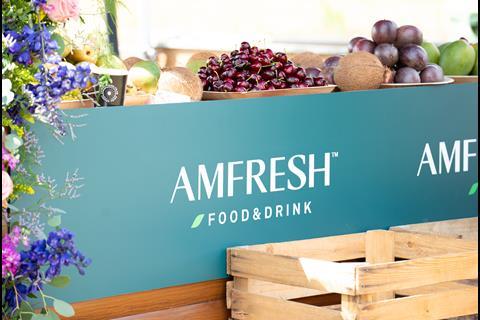Produce category director Tom Mackintosh says it is time for Tesco to find new balance between long-term contracts and greater responsiveness to the market following shortages
Tesco’s produce category director Tom Mackintosh drew the biggest crowd of Festival of Fresh, as 300 people from across the UK fruit and vegetable trade converged on Alconbury Weald for a day of hard-hitting interviews, fantastic networking, and delicious food.
Fresh Produce Journal’s flagship event on 21 June was hosted by the UK’s biggest fresh produce business AMFRESH at its new site in Cambridgeshire, which is home to a highly automated new packhouse and innovation centre.
Celebrating some of the best innovations in Britain’s fresh produce business, the open-air festival featured a wide array of exhibitors including Veg Power, JD Cooling, NFU Energy, City Harvest, and many more.
The event provided a platform for the sector to network and discuss the pressing challenges in continuity of supply, inflation, climate change, R&D, and seasonal labour recruitment, among other hot topics.
And the speaker programme included contributions from leading figures in the UK’s fruit and vegetable supply chains, including retailers, suppliers, importers, marketers, and breeders, as well as trade bodies, retail analysts, and food redistribution companies.
Rethinking retail buying
Sessions were divided between two tents: the Inspiration Stage (for interviews, panels and presentations on the hot topics in the trade) and the Innovation Tent (for presentations on cutting-edge new technologies).
Despite general optimism about the enduring appeal of fresh produce as a healthy and sustainable food category, there were frank discussions about how to rebalance value in the supply chain while inflation remains high and erratic weather contributes to unpredictable supply.
In an interview on the Inspiration Stage, Mackintosh spoke candidly about why it was time for Tesco and other retailers to rethink their sourcing approach and find a new balance between long-term contracts and greater responsiveness to the market.
“I think we need to be a bit more open-minded about our supply chain, and that means becoming a bit more focused on resilience and a bit less focused on perhaps just streamlined consolidation,” he told the audience.
Responding to questions about the empty shelves seen at all of the UK’s major supermarkets in February and March this year, the Tesco man said the major multiples needed to be more dynamic and “do a better job” of fostering close relationships with their overseas suppliers so that they aren’t overlooked again when supply is tight.
He conceded that the salad vegetable shortages in February were “not a one-off”, saying it was sometimes a case of “the tail wagging the dog” at the moment.
“We’re selling what is available rather than deciding to drive a trade plan for customers, and we’ve got to get right back on the front foot with that,” he told the audience.
The problem with promotions
There was time for some tough questions from the audience, and in typically boisterous fashion Tim O’Malley of Nationwide Produce spoke up for UK vegetable growers by calling for an end to “vegetable giveaways” at Christmas and Easter. Think 19p bags of potatoes at Christmas.
“It occurs to me that it’s no good for anybody,” he said. Grower-packers, in particular, “need it like a hole in head”.
Mackintosh responded that he is proud of the supermarket’s approach to looking after their cash-strapped shoppers with healthy promotions, but said shoppers need to be given a choice between different tiers of produce and properly educated in the benefits of trading up if they can afford to.
‘Broken retail model’
In an industry leaders panel that involved Martin Emmett (NFU), Jack Ward (Brtish Growers), James Simpson (BAPL), and Nick Marston (British Berry Growers), Marston stressed that the retail model was “broken” and “not fit for purpose”.
Marston criticised the tendency for low fixed-price points, matched to the lowest-price supermarkets, that stay the the same ”all year round”.
“What it’s doing is driving growers out of business,” he said. “If we look at the berry sector, gross costs have increased by 25 per cent over two years and growers’ returns to date have increased by absolutely nothing.
“I think a reset is desperately required. If we don’t do that, we’ll have empty shelves. And in berries specifically, there’s nowhere else to go.
“The government mantra always used to be well if we can’t produce it here, we can buy it cheaper somewhere else – steel, coal, whatever it may be. That’s not true of most fresh produce. It’s certainly not true of berries.”
Labour demands
On the key issue of seasonal labour, there was agreement on the panel that the government’s allocation of 45,000 seasonal workers in 2023 and 2024 would be sufficient.
But Emmett called for extra provision to allow the industry to expand production going forward. He also reiterated industry demands for the duration of visas to be extended from six to nine months.
“We need assurance that we have the labour we need for the future, not just the immediate future,” he said.
‘Stifling new berry varieties’
Other sessions on the Innovation Stage included a discussion with Jack Ward (Horticulture Crop Protection) and Mark Taylor (GB Potatoes) looking at the future of crop protection and R&D post-AHDB, as well as an insightful conversation with Andy Pembroke, MD of the dynamic foodservice supplier Fresh Direct.
In addition, there were overviews of the latest retail trends and data from Kantar’s Beatrice Lugli and IGD’s Susan Barratt, and a raft of marketing ideas and research from Carolina Palomo of AMFRESH.
Palomo’s wide-ranging presentation explored ways of driving everyday fruit consumption, reaching younger consumers, effectively marketing fruit as a snack, and making it easy and fun for consumers.
In a previous interview, there was a critical assessment of the structure of the UK soft fruit sector from the CEO of S&A Produce, Peter Judge. He stressed that the UK berry market puts disproportionate power in the hands of the big marketing desks, which stifles the development of new British varieties.
This is why S&A Produce decided to market its new strawberry variety Lady Emma in Europe, where marketing desks are less dominant and there are more independent growers. With S&A expecting to sell 15 million plants on the continent next year, the approach seems to have paid dividends.
Improving worker welfare
An afternoon session on sustainability featured plenty of lively debate, with interviews on Freshgro’s journey to launching carbon-neutral Chantenay carrots, ethical labour, rescuing surplus produce, and opportunities in organics.
David Camp of the Association of Labour Providers spoke frankly about how seasonal worker welfare was compromised last season due to the war in Ukraine, a lack of organisation from government, and difficulties faced by labour providers.
He highlighted concerted efforts from multiple stakeholders in the industry to improve the situation going forward, but was honest about the exploitation, discrimination, and poor living conditions faced by workers on some farms.
On the food rescue panel, meanwhile, City Harvest, FareShare and The Bread and Butter Thing united in calling for additional support from the fresh produce sector. Nevertheless, there was disagreement on the need for government funding in food redistribution, and it was evident that there is room for improvement in how the organisations collaborate to ensure that as much surplus finds a home as possible.
Rounding off the day on the Inspiration Stage, Alex Cullen from the Soil Association spoke about opportunities for the organic sector to bounce back from a sales slide linked to the cost-of-living crisis.
Cutting-edge tech
Over in the Innovation Tent, there was a fascinating range of presentations on the technologies shaping the future of the industry.
Speakers included Victoria Jones from workforce software provider QAD Redzone, and Lizzy Parker from emissions tracking solution Farm Carbon Toolkit. Jack Ward and Clare Otridge presented a new retail data service to replace Produce View called British Growers Insights.
Keep your eyes peeled for more in-depth news stories from Festival of Fresh 2023 in the coming days.














